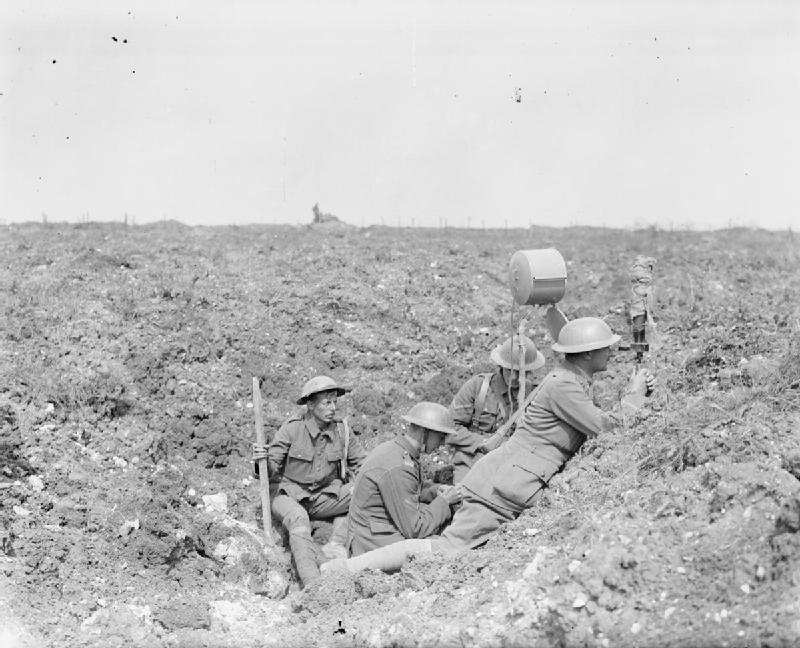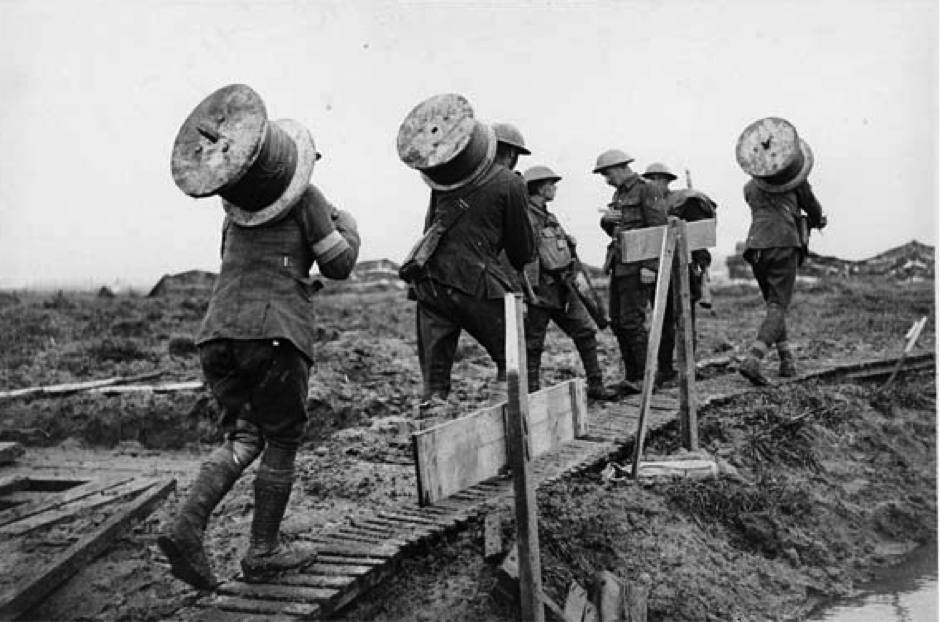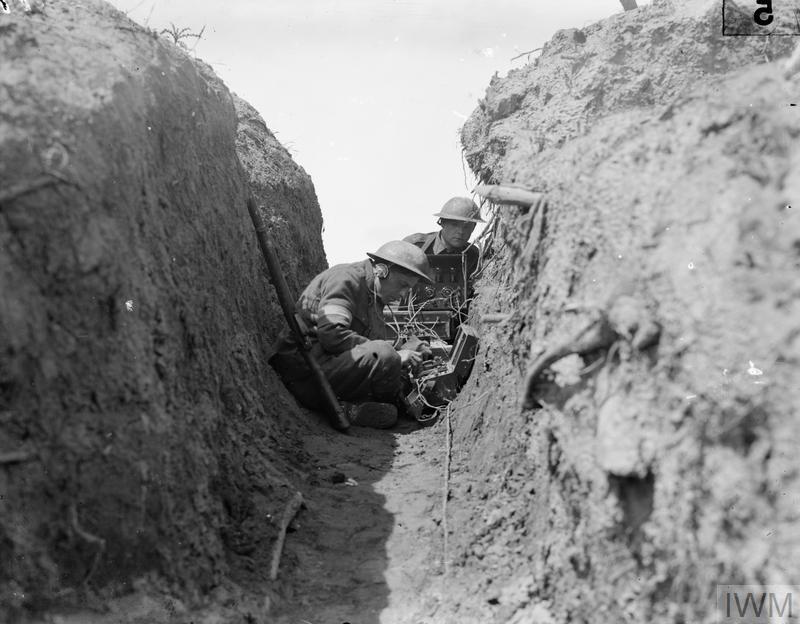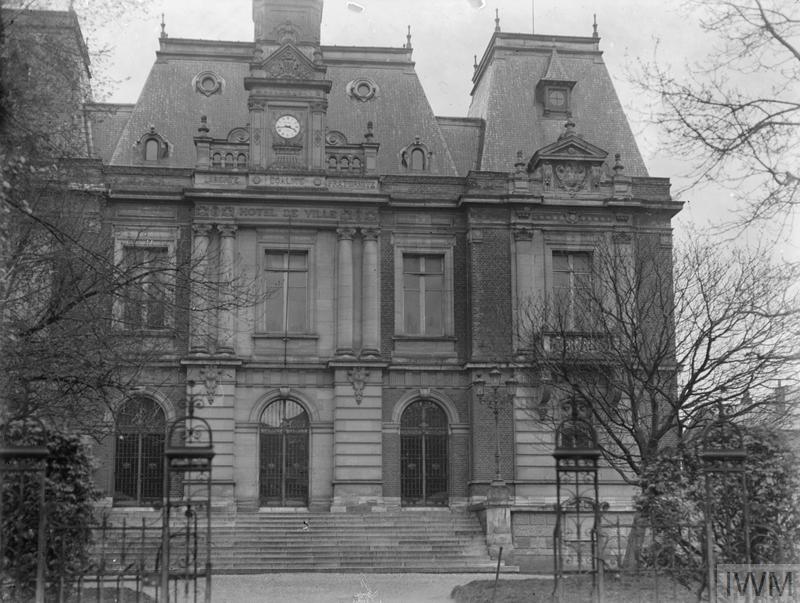A Personal Account of World War I
by G. V. Elwin
Chapter 2
The Somme: July 1st – November 18th 1916
The great Somme offensive on 1st July 1916 was intended to break through the German trenches and create a gap through which an overall advance could be made. The previous day, 30th June, two of our signallers went on duty at our observation post, equipped with two extra telephones and two miles of telephone wire on drums, ready to follow up the anticipated advance.
Royal Engineers taking drums of telephone wire along a duck board path up to the front between Pilckem and Langemarck, 10 October 1917. Photograph by official war photographer Lt. John Warwick Brooke, courtesy of the Imperial War Museum, image no. Q6050.
I was on duty on a shallow dug-out just behind our guns along with the Major and a junior officer named Lieutenant Docherty, the Major to direct the fire of our guns according to the many targets we would be receiving. I would receive the targets from our Brigade H.Q., pass them to the Major, who would consult his maps and direct his gunfire. Lt. Docherty was a sort of helper to the Major. He was a very jumpy, excitable sort of chap and many times went up and down our 3-4 steps into the dug-out to see if any of the German shelling was falling near our guns. Picture the scene. Myself receiving targets for our guns, the Major poring over his maps and Docherty bobbing up and down our steps to report on German shelling.
Then it happened. Docherty went up the steps to report where a German shell had fallen and if it was near our guns when a second German shell burst near him. A small splinter of red-hot metal hit him in the back of the head, killing him instantly. His body tumbled grotesquely down the steps into the dug-out between me at my table and the Major’s table. The Major shouted one word: “Docherty” then went up the steps to fetch help. Some of our men removed the body and the Major and myself went on firing the guns. It was a dreadful incident and very upsetting to the nerves.
First day of the Battle of the Somme: July 1st 1916
Our guns were firing all day and into the night, but to no effect. The attack on July 1st achieved practically nothing and the British Army had 60,000 casualties on that one day killed, wounded and missing. This latter category usually meant blown to pieces or captured by the Germans. A few smaller offensives followed, but everything gradually became quiet. Our guns had fired many hundreds of shells, each weighing 60 pounds and the gun crews were very tired. I should record here that whilst we were preparing for the July 1st offensive, a new battery of 60 pounders like our own took up position in the grounds of a deserted French chateau. To our astonishment two of the members were our two old friends who had enlisted with us (Herbert Blatherwick and Will Bradbury). We had experienced a year in action in France and they were newcomers. We had much to talk about.
Martinsart: August 1916
In August 1916 we left Sailly-au-Bois and found ourselves in Martinsart, again a deserted village. We established ourselves in the cellar of an estaminet (French public house) by night and in the kitchen by day. The kitchen had the usual cooking stove and we did quite a lot of our own cooking. A favourite meal was fried cheese. It should be emphasised here that everyone had to do the best for themselves or their particular group.
Our estaminet was on the main street with an archway opening onto the street. One night a convoy of food supplies was passing by when one of our little crowd living in the cellar said: “I’ll go and see if we can get anything.” He went out and a few minutes later walked in again with a huge sack of white flour on his back. He had removed it from the back of a passing wagon. We always had plenty of butter so we had pie crust with everything for some time. It was not regarded as stealing, it was regarded as looking after oneself and safeguarding an individual’s life, the paramount job of everyone’s life.
Similarly there was a huge coal dump in the market square of Martinsart, guarded day and night by two soldiers. It was a square dump and they paraded the four sides, meeting at the same two corners time after time. Whilst they were furthest away from us we crept in with empty sandbags, filled them with coal and made haste back to our kitchen. We had coal in that way for many weeks to keep us warm and for cooking. We felt it was necessary to ease the burden of our rough and dangerous life. We could be killed next day, any of us.
Shortly after arriving at Martinsart, our beloved Major Hanna went home to England in retirement and we received a Captain Healing to take charge. He was a good officer, liked and respected by the men, but he was only with us for some three months to our regret.
One disturbing incident occurred whilst he was with us. Again I was involved. Our command post was a small corrugated iron hut in which I was on duty. No heat and perishing cold in the night hours. To be near the telephone, Captain Healing had a small canvas hut erected about twenty yards from where I sat. In my mind I can still see the small light of his one candle showing through the canvas walls. It was night time and he was not in his hut when a German shell came over and burst under his hut blowing it sky-high with all his belongings. The hut I was in sixty feet away was showered with clods of earth, but fortunately no shell splinters. It was another disturbing incident for me. Shortly afterwards Captain Healing left us and in came a colonel about 40-45 years old. He was newly out to France, recently trained and with no experience. I won’t give his name but I remember it well. He was self-opinionated, big-headed and soon became completely hated by all our men. He did however change my life completely about twelve months later, but more of that I will write later.

Royal Garrison Artillery signallers on the Somme, September 1916. Photo by official war photographer Lieutenant John Warwick Brooke
Our guns were situated on the outskirts of Martinsart and our observation post was in a trench running along the ridge of a small hill. It was called JPI and was approached by a communication trench winding up the hill. They were favourite targets for the Germans as troops were constantly going up to the front and second line trenches or coming down from them. Picture the scene. Two of us going up to the O.P for 24 hours duty at 6 a.m, mud bespattered, carrying a two-gallon petrol tin filled with drinking water, gas mask, steel helmet and haversack containing food. Part way up the trench we would frequently meet about 200 infantry men coming down. The trench could be anything from ankle deep mud to nearly up to the knee. We would stop and flatten ourselves to the trench sides whilst 200 men, fully equipped with rifles, etc., would pass by. They were tired and cared little for us. When they had passed us we continued our way to our observation post.
One morning going up at 6 a.m., it was quite daylight and my companion was a great friend of mine. We had worked together quite a lot. His name was Jim Pearce. We were just approaching the entrance to the trench when the Germans started one of their periodic sessions of shelling the entrance. We were absolutely in the midst of the bursting shells.
Jim dropped everything he was carrying and ran away as fast as he could. He took a great risk as shell splinters were flying in all directions. Had just one splinter hit him he could have been killed or seriously wounded. For myself, as soon as the shelling started I too dropped everything, but instead of running away, I dropped flat to the ground, burying my face in the mud and gripping my steel helmet on the back of my head and over my neck. It was all voluntarily and done on the spur of the moment. I was frightened and found myself praying, saying out loud: “Oh Lord stop them shelling,” and “Oh Lord don’t let them hit me.” I don’t profess to be an extra-religious man and these prayers came quite naturally and spontaneously to my lips. As it was, I was showered with falling lumps of earth blown up by near explosions.
Then the shelling stopped and I was up on my feet and racing for the shelter given by the entrance to the communication trench. I was pleased to see Jim Pearce racing up a few minutes later. We then proceeded to our observation post to do our stint of duty. Very shaken but so very thankful to be alive. I think it was shock to the nerves but my whole body was bathed in perspiration. I have never had it again.
On another occasion coming from our observation post we had to walk part way along a narrow Decauville railway track, used by our troops to take up supplies. The Germans started shelling the track and we, Alf Seales and myself, ran for our lives. Life was very, very uncertain.
Again at Martinsart our corporal signaller and four other signallers were sleeping in the cellar of a small brick building when the Germans shelled us. They hit their building which collapsed on top of them. We had to remove a whole pile of bricks to get them out. Fortunately the cellar withstood the weight of the bricks piled high over them. They all came out alive but the corporal went home with shell shock, a common complaint, and never returned.
Battle of the Ancre November 13th – 19th, 1916
Then came the two battles of Beaucourt and Beaumont Hamel (Battle of the Ancre). Both were quite successful as the Germans were thrown back and had to vacate their strong defensive positions. Again Jim Pearce and myself were very much involved. We went up to our observation post the day prior to the attack with two days rations and a can of water to make tea if possible. These two days were the heaviest of my army career. We sent back hundreds of reports of enemy firing, our own firing, SOS flares, etc. Additionally our telephone line was broken at least twenty times. This was the worst part for one of us would have to climb out of the trench, telephone line running through one hand until we came to the break and then wait until a signaller from the battery arrived when we joined up the break. It was dangerous work and we took turns to sally out. We had no sleep for 48 hours, were mud-stained from head to foot, wore a gas mask, steel helmet and telephone as our only equipment. When we were relieved we staggered down to the battery and fell asleep straightaway in our cellar. We slept non-stop for over twelve hours each and awoke ravenously hungry.
Rest and Recreation
There was a very pleasant sequel to our two days and nights of trial. Some two or three weeks later we were told to our utter astonishment that both Jim Pearce and I were to go for a week’s rest at the seaside. It had never happened previously to anyone in the battery and sad to relate it never happened again. So off we went to a seaside camp which had been established for troops needing rest and quiet. It was a tiny French village called Onival (north of Dieppe), occupied by civilians and very, very peaceful.
We did absolutely nothing at all. Just one parade for a few minutes at breakfast time to make sure everyone was present and had not deserted the army. Then we bathed and paddled in the sea. How wonderful it was to feel the cool fresh sea on our dirty, lice ridden bodies. We burnt with matches the lice and eggs in the seams of our clothing. We really felt we had returned to civilisation from the terrors of war. Unbroken sleep at night in comfortable beds added to our enjoyment. So the blissful seven days passed all too quickly and we found ourselves once again with our battery and the dreadful business of war. However, the fighting had died down and things seemed quiet and peaceful, apart from routine work which never ceased. The foregoing had all happened about September-October 1916.
Doullens: Christmas 1916
Then shortly before Christmas 1916 we were told the whole battery was going out of action and would spend a week at Christmas resting at a small township called Doullens, a few miles behind the lines of the trenches. A guard of half a dozen men were left behind to guard the guns and ammunition which stayed in their firing positions. The basement of the local museum had been rigged up with bunk beds of wood frames and chicken wire. The great bonus, however, was that for seven nights we had unbroken sleep. We answered roll call before breakfast and after breakfast had the rest of the day to ourselves but had to be off the streets and in our museum basement home by 10 o’clock. Military police paraded the streets day and night to ensure good behaviour. All the shops were available to us and the French people were very kind. We had little money, however. Some of the men went on drinking bouts and came back to the basement in drunken condition. Most unpleasant to me as I was a non-alcoholic. Drinking was not very popular. The men wanted beer but none was available. The local estaminets sold only vin blanc and vin rouge which the men called “horse piss.”
One day I saw driving down the main street of Doullens a small Red Cross ambulance with the words on its side “No. 6 Motor Ambulance Convoy”. Now this was important to me as the two brothers of the girl I married later in life were with No. 6 Motor Ambulance Convoy as ambulance drivers. I made enquiries and found they were based at a village about four miles from Doullens. I set out one morning and walked the four miles and found them. We were three delighted men and I stayed until after midnight. I knew I had to be back by 10 p.m. but that did not worry me as I thought I could dodge the patrolling military policemen in Doullens. The brothers walked with me for a few hundred yards on my return until an army lorry came along going my way. I said a hasty good-bye, ran and jumped to get a handhold on the half board track of the lorry. I was hard, tough and strong after all I had been through so I could easily climb into the back of the lorry.
Unfortunately it was loaded with coal and I collected coal dust on my uniform. The driver called back to me and asked where I was going and I said Doullens. He didn’t speak again and I was just debating where was the best place to drop off the moving lorry when to my horror he turned off into another direction and I hastily had to drop off right in front of a sentry on guard duty at the entrance to Doullens township. He called the usual “Halt. Who goes there?” So I said “Friend” and walked up to him. We had to have pass-outs if we were going to be out after 10 p.m. and I hadn’t got one. “Where’s your pass?” he said. I fumbled in my wallet in my breast pocket and showed him an old one I had used a few days earlier. I held my breath but he never noticed the date so I walked into Doullens. It was easy after that incident. I just peered round every corner I came to so that I didn’t run into the police. After several scary moments I reached the safe refuge of our museum basement.
Now over seventy years later the whole of this incident is very clear in my memory. But then I was only twenty one and a half years old, tough, a hardened soldier and it took very much to upset me.



